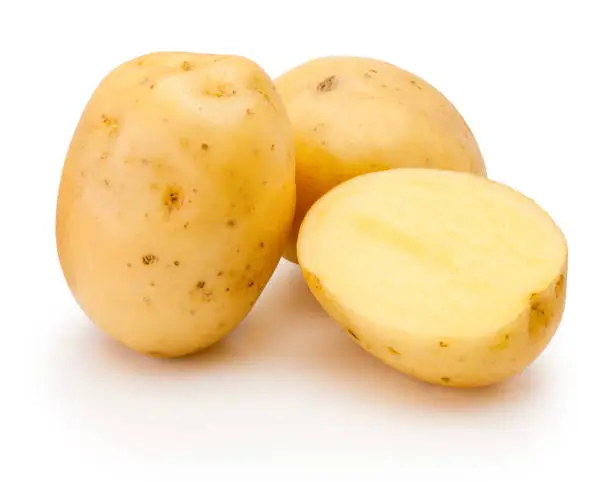Potatoes have calcium, magnesium, and folate, which are good for you. If you want to keep your potato healthy, go easy on the fatty stuff like cheese, sour cream, and butter. You can also try putting healthy and high-protein things on your baked potato, like homemade chili, taco meat, black beans, corn, and salsa.
Calcium is a mineral that our bodies really need, especially for keeping our bones strong and healthy. We get a lot of our daily calcium from dairy foods, like milk and cheese. But there are other foods that have calcium too, like almonds, broccoli, green leafy veggies, oysters, tofu, and beans. Surprisingly, even some carb-rich foods like breakfast cereals, tortillas, white bread, and potatoes have a decent amount of calcium.
While potatoes aren’t exceptionally high in calcium, they do contain other important minerals like potassium and magnesium. These minerals are essential for maintaining proper muscle and nerve function.
Importance Of Calcium
In our bodies, calcium has an important job. It’s mainly known for building strong bones, but it does more. Calcium helps muscles work, keeps our heartbeat steady, lets our nerves talk to each other, and helps in making hormones and cell communication. Our body keeps a close watch on calcium levels, so even if our diet changes, they stay steady. If there’s not enough calcium, our body takes it from our bones to use in other places.
Calcium Content in Potatoes
Now, let’s address the main question: Are potatoes high in calcium? The simple answer is no. Potatoes are not considered a significant source of calcium. In fact, they contain very little calcium, with approximately 10 milligrams of calcium in a medium-sized potato.
When it comes to calcium, potatoes do have a little, but it depends on how you prepare them. Let’s break it down:
- Baked Potato: A baked potato with its skin has around 26 milligrams of calcium. But if you remove the skin, it drops to just 8 milligrams.
- Sweet Potatoes: If you’re a fan of sweet potatoes, you’re in luck. Baked sweet potatoes have the most calcium among all the potato types, with about 68 milligrams per potato.
- Cooking Matters: The way you cook your potato makes a difference. A microwaved potato contains roughly 20 milligrams of calcium, while a boiled one has only about 7 milligrams.
So, if you want to get more calcium from your potatoes, consider leaving the skin on and perhaps trying sweet potatoes. But remember, there are better sources of calcium out there, like dairy products and leafy greens.
Potato Nutrition
Alright, let’s talk about what’s really in a potato, especially when you bake it.
- With the Skin: A baked potato, skin and all, gives you about 161 calories. It’s got 4 grams of protein, a tiny bit of fat (just 0.2 grams), and a good amount of carbs – about 37 grams. Plus, you get roughly 4 grams of fiber, which is good for your tummy. And here’s the great part: no cholesterol!
- Without the Skin: If you decide to peel off the skin, the numbers change a bit. Now, your potato has about 145 calories, 3 grams of protein, 33 grams of carbs, and only 2 grams of fiber. But the fat content stays about the same – not much there.
Now, sweet potatoes are a bit different. They’ve got more calcium than other types, and they’re rich in fiber:
- Sweet and Healthy: A baked sweet potato, skin and all, gives you around 162 calories. You’ll find 4 grams of protein, a touch more fat (0.3 grams), 37 grams of carbs, and a healthy 6 grams of fiber.
So, whether you like your potato with or without the skin, there’s plenty of good stuff in there to enjoy. And sweet potatoes? Well, they bring their own special kind of goodness to the table.
The Value of Potatoes in Your Diet
While potatoes may not be rich in calcium, they offer several nutritional benefits that make them a valuable addition to your diet. Here are some reasons why you should enjoy potatoes in moderation:
1. Energy Source
Potatoes provide a quick and efficient source of energy due to their carbohydrate content. They can be particularly beneficial for athletes and those with active lifestyles.
2. Fiber for Digestive Health
The fiber in potatoes supports a healthy digestive system, preventing constipation and promoting regular bowel movements.
3. Vitamins and Minerals
Potatoes supply essential vitamins and minerals that are important for overall health. They contribute to immune function, brain health, and various bodily processes.
4. Versatility in Cooking
Potatoes are incredibly versatile and can be prepared in numerous ways. You can enjoy them mashed, roasted, baked, or even as French fries. Their adaptability makes them a popular choice for many dishes.
Takeaway:
Even though potatoes don’t have a lot of calcium, they bring other good stuff to your meals, like vitamin C, fiber, and complex carbs. So, it’s totally fine to enjoy potatoes, but don’t count on them to give you all the calcium you need.
Potatoes aren’t the best source of calcium. If you want to make sure you get enough, mix up your diet with foods that have more calcium. A balanced and varied diet is the secret to staying healthy and well-nourished.
Frequently Asked Questions:
1. Do potatoes contain a lot of calcium?
Potatoes have a little bit of calcium, but they’re not a very high source of it.
2. Can I get most of my calcium from eating potatoes?
No, you should look to other foods like dairy, nuts, and leafy greens for more calcium.
3. Are sweet potatoes a better source of calcium than regular potatoes?
Sweet potatoes have a bit more calcium than regular potatoes, but it’s still not a major source.
4. What foods are high in calcium if not potatoes?
Foods like milk, cheese, yogurt, and leafy greens like spinach are better choices for calcium.
5. How much calcium do I need each day?
The amount of calcium you need depends on your age and gender, but it’s usually around 1,000-1,300 milligrams per day for adults.
6. Can I increase the calcium in my diet with potato toppings?
Yes, you can add cheese or other calcium-rich toppings to increase the calcium content of your potato dish.


